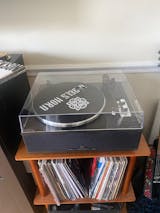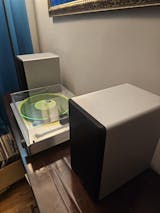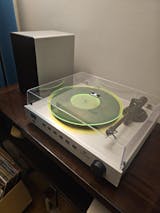40g Vs 180g The Benefits of Vinyl Weight Explained
#1Vinyl Weight Explained
Vinyl records vary in weight from 40 grams to 180 grams, with each record's weight depending upon the speed at which it was created to be played. This speed is determined in transformations per minute (RPM) and varies between 33 1/3 and 78. The faster the record, the less documented noise can be hung on each side.
Below is a description of each of the kinds of records and how their speed refers to their weight.
33s: The Biggest, Slowest, and Heaviest Records
The heaviest vinyl records are made to be dipped into 33 and 1/3 transformations per minute (RPM) and can hold an album's worth of taped music. 33 1/3 RPM records are frequently called "33s." These records, which weigh 180 grams, are frequently identified with characteristics like "audiophile-grade" and "heavyweight.".
They can hold more documented audio on each side since 33s play at a slower rate of transformations per minute. There is a compromise in speed for size-- quicker records have much better sound quality. However, they can hold one or 2 tunes worth of taped music. Lighter records are less long-lasting, while the much heavier 33s have more resistance than scratches and other wear types.
In addition, 78s, the fastest type of vinyl record, is almost outdated due to the exceptionally minimal quantity of music that can be saved on each side. Instead of faster, lighter records, the 33 RPM LP has become the most typical kind of vinyl on the market today.
78s and 45s: Lighter and Faster with Fewer Songs on Each Side
In addition to 180g 33s, numerous other types of records are categorized by their RPM-- 45s and 78s. Songs had the main track-- understood as the "A-Side"-- and a secondary track-- called the "B-Side," and there was no space for any more than a couple of minutes of documented music on each side of the record.
These records typically weigh 100 grams and are just a couple of inches smaller than 12-inch 33s. In the early days of the record gamer, these records were made not from vinyl but shellac.
What makes a 180g, 33 RPM record special? Keep checking out to discover:
- Much Heavier Vinyl May Yield Better Sound Quality.
While it's still up for argument whether 180g vinyl has significantly much better sound quality than lighter records, several distinct attributes of the heaviest records can add to a fantastic listening experience. Below are simply a couple.
- A Heavier Record Keeps Your Turntable's Stylus More Stable.
As a record spins on your turntable, getting it to produce sound starts with your stylus. The stylus, frequently referred to as the needle of the record gamer, is a little piece of rough diamond that flights in the grooves of a record as it spins.
- The weight of a 180g record permits it to keep itself constant and steady as it spins.
The heaviness of a 180g vinyl can enhance your signal-to-noise ratio-- the quantity of music you hear compared to the quantity of distortion and fixed your turntable produces-- permitting you to get the most satisfactory possible listening experience from each record.
- Much heavier Records Are More Resistant to Tear and use.
Since vinyl records are a hunk of concrete, physical kind of documented music, they have the prospective to get scratched, distorted, and broken. All of the various kinds of damage that a vinyl record can go through can interfere with sound quality, and some more severe types of wear and tear can render a record unplayable.
Among the most significant advantages of much heavier records is their capability to withstand damage. The weight of an audiophile-grade LP offers it an intrinsic resilience, which suggests it is most likely to keep sounding helpful for a long, very long time.
The high quality of heavy records does not indicate that you do not need to keep them thoroughly. Like all vinyl, 180g records require regular maintenance and appropriate storage to remain in good condition. The best method to keep any record sounding terrific for as long as possible is to save them horizontally in a temperature-controlled area, utilizing protective sleeves and other specialized equipment to keep them safe from scratches.
Are Heavier Records Worth It?
One factor to consider that every record collector requires is how much they wish to purchase vinyl. 180g records tend to be more pricey than their lighter equivalents, which might dissuade some collectors from paying out the additional money. Eventually, it's up to you to choose the degree of your commitment to vinyl records and identify whether 180g vinyl deserves you.
While lighter vinyl records might not be as stable or long-lasting as 180g 33s, you can still get fantastic noise from a lighter record. In addition, LPs typically do not weigh less than 150g, which implies you do not need to fret about huge spaces in sound quality or toughness when you select a lighter record.
What Else Makes Records Sound Great?
While vinyl weight can contribute to general sound quality, many other aspects enter play while you're on your journey to get terrific noise. Take a look at the quality of these 2 things if you're looking to take practical actions to enhance your listening experience.
Without a preamp, you will not be able to hear any music as your turntable spins. A premium preamp can include color and heat to your turntable's noise, and it's constantly worth the financial investment to include one in your setup.
For AngelsHorn Vintage Gramophone Shop Products:
Angels Horn Store:

Bring music to life.
AngelsHorn Mission
The cartridge is one of the essential parts of any record gamer. It houses the stylus, which is one of a couple of parts of the turntable that directly contact the record itself.
Conclusion.
To find out more about the tricks of getting excellent noise from your records, look at The Sound of Angelshorn® blog site.











Leave a comment